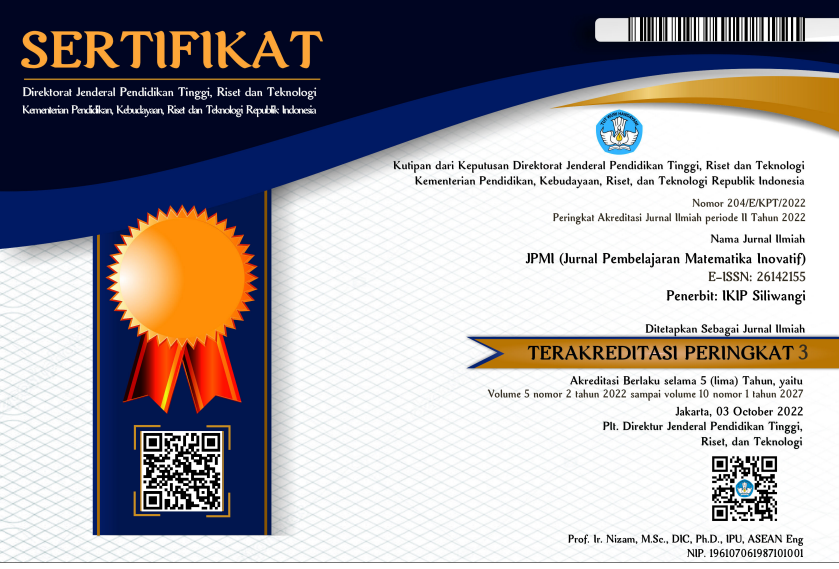PENERAPAN PROBLEM-BASED LEARNING UNTUK MENINGKATKAN KEMAMPUAN PENALARAN MATEMATIS DAN SELF-CONFIDENCE SISWA SMK
DOI:
https://doi.org/10.22460/jpmi.v6i2.10223Kata Kunci:
Mathematical Reasoning Ability, Self-Confidence, Problem-Based LearningAbstrak
Referensi
Ahmad, G., Akbar, M., Diniyah, A. N., Akbar, P., & Nurjaman, A. (2018). Analisis Kemampuan Kemampuan Penalaran Dan Self Confidence Siswa Sma Dalam Materi Peluang. Journal On Education, 1(1), 14–21. https://jonedu.org/index.php/joe/article/view/5
Ario, M. (2016). Analisis Kemampuan Penalaran Matematis Siswa SMK Setelah Mengikuti Pembelajaran Berbasis Masalah. Jurnal Ilmiah Edu Research, 5(2), 125–134. https://www.neliti.com/publications/58732/analisis-kemampuan-penalaran-matematis-siswa-smk-setelah-mengikuti-pembelajaran
Dian Andriani, U. A. (2019). Analisis Kemampuan Koneksi Matematik Dan Kepercayaan Diri Siswa Smp. Jurnal Pembelajaran Matematika Inovatif, 2(1), 25–32. https://www.journal.ikipsiliwangi.ac.id/index.php/jpmi/article/view/2384
Elva Pristy Afifah1, Wahyudi2, Y. S. (2019). Efektivitas Problem Based Learning Dan Problem Solving Terhadap Kemampuan Berpikir Kritis Siswa Kelas V Dalam Pembelajaran Matematika Universitas Kristen Satya Wacana Pendahuluan Kurikulum Yang Berlaku Di Indonesia Sekarang Ini Adalah Kurikulum 2013 . Kur. Journal Of Mathematics Education, Science And Technology, 4(1), 95–107. https://journal.um-surabaya.ac.id/index.php/matematika/article/view/2822
Fitri, R., Mustika, H., S, I. F. A., Learning, P. B., Pembelajaran, V., & Matematika, P. K. (2022). Efektivitas Model Problem Based Learning Berbantuan Video Pembelajaran Terhadap Peningkatan Pemahaman Konsep Matematika The Effectiveness Of The Problem Based Learning Model Assisted With Video Learning On Improving Understanding Of Math Concept. 5. https://ejournal.iainbengkulu.ac.id/index.php/equation/article/view/6385
Hajar, M. S., & Minarti, E. D. (2019). Pengaruh Self Confidence Siswa SMP Terhadap Kemampuan Berpikir Kritis Matematis. MAJAMATH: Jurnal Matematika Dan Pendidikan Matematika, 2(1), 1. https://doi.org/10.36815/majamath.v2i1.293
Muhson, A. (2009). Melalui Penerapan Problem-Based Learning. Jurnal Kependidikan, 171–182. https://journal.uny.ac.id/index.php/jk/article/view/203
Mulyana, A., & Sumarmo, U. (2015). Meningkatkan Kemampuan Penalaran Matematik Dan Kemandirian Belajar Siswa SMP Melalui Pembelajaran Berbasis Masalah. Didaktik, 9(1), 40–51. . http://e-journal.stkipsiliwangi.ac.id/index.php/didaktik/article/view/116
Mustakim, M. (2020). Efektivitas Pembelajaran Daring Menggunakan Media Online Selama Pandemi Covid-19 Pada Mata Pelajaran Matematika. Al Asma : Journal Of Islamic Education, 2(1), 1. https://doi.org/10.24252/asma.v2i1.13646
Prihantoro, A., & Hidayat, F. (2019). Melakukan Penelitian Tindakan Kelas. Ulumuddin : Jurnal Ilmu-Ilmu Keislaman, 9(1), 49–60. https://doi.org/10.47200/ulumuddin.v9i1.283
Putri, H. E., Suwangsih, E., Rahayu, P., Aulia, L., Afita, N., Yustika, N. K., Dewi, A., & Yuliyanto, A. (2021). Improving Elementary School Students ’ Self-Confidence During The Covid-19 Pandemi. Jurnal PAJAR, 5, 306–316. https://pajar.ejournal.unri.ac.id/index.php/pjr/article/view/8193
Safitri, A. O., Handayani, P. A., Sakinah, R. N., & Prihantini, P. (2021). Implementasi Kurikulum 2013 Dalam Pembelajaran Jarak Jauh Pada Masa Pandemi Covid-19. Jurnal Basicedu, 6(1), 116–128. Https://Doi.Org/10.31004/Basicedu.V6i1.1926
Salamah, F. N., & Amelia, R. (2019). UPAYA MENINGKATKAN SELF CONFIDENCE SISWA SMK. Jurnal Cendekia: Jurnal Pendidikan Matematika, 3(1), 28–33. https://www.j-cup.org/index.php/cendekia/article/view/68
Siagian, M. D. (2000). Kemampuan Koneksi Matematik Dalam Pembelajaran Matematika. Journal Of Mathematics Education And Science, 58–67. https://jurnal.uisu.ac.id/index.php/mesuisu/article/view/117
Sumantri, M. S., & Satriani, R. (2016). The Effect Of Formative Testing And Self-Directed Learning On Mathematics Learning Outcomes. International Electronic Journal Of Elementary Education, 8(3), 507–524. https://eric.ed.gov/?id=EJ1096528
Sumartini, T. S. (2015). Peningkatan Kemampuan Penalaran Matematis. Jurnal Pendidikan Matematika, 5(April). https://journal.institutpendidikan.ac.id/index.php/mosharafa/article/view/mv4n1_1.

















